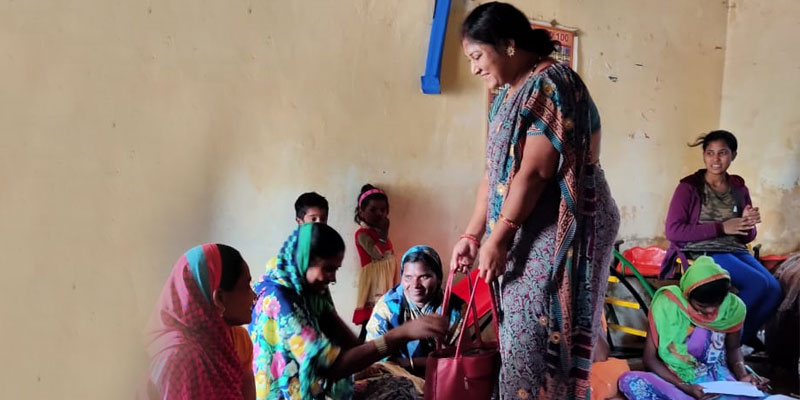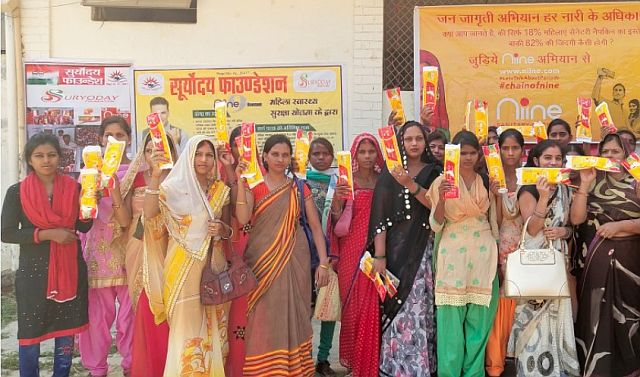Mondelez India donates over 140 tonnes of goodies for Covid-19 relief
Mondelez India, the makers and bakers of some of India’s favourite snacking brands – Cadbury Dairy Milk, Cadbury Bournvita, Oreo, announced an additional relief contribution of over 70 tonnes of products to support relief workers and the migrant population. The company in total has donated over 140 tonnes of chocolates, biscuits and beverages to India FoodBanking Network (IFBN) across 20 cities. Of this, MFD brand Cadbury Bournvita will be directed to hospitals.
The company is also donating dry ration kits to support over 8600 families in communities around its factory locations in Himachal Pradesh, Madhya Pradesh, Andhra Pradesh and Maharashtra.
Ophira Bhatia, Director – Corporate & Government Affairs, India, Mondelēz International, said, “We are proud that globally Mondelēz International has donated well over $20 million in cash and in-kind donations to advance Covid-19 pandemic relief efforts surpassing our $15 million global commitment. As a company that has had close to 75 years of commitment to India, we are providing our much-loved products – that are safe, easy to consume and tasty – to workers in the frontline who are striving to bring this pandemic under control, and migrant workers travelling back to their homes. We also continue to support the communities around our manufacturing locations with dry rations to tide them over these difficult times. It is heartening to see every part of our business – our colleagues, our brands also pitch in to support Covid-19 relief efforts.”
The employees of Mondelez India have also donated 110,000 meals to the poor and needy through the Akshaya Patra Foundation, through employee giving. Brands like Cadbury Dairy Milk continue to live their purpose by launching a limited-edition Cadbury Dairy Milk ‘Thank You’ bar, in recognition of the generous spirit of the country’s unsung heroes during these difficult times. The company has committed part proceeds from sales of these special chocolate bars towards health insurance policies of the daily wage earners, via a partnership with Nirmana, an NGO that works with the unorganised sector.
As part of this, here is the consolidated list of efforts undertaken by the company in India:
– Mondelez India donated 1,00,00 masks, 45 sanitizer cans of 5 litters and 3,000 sanitizer bottles of 50 ml across hospitals and police stations in Mumbai to support the Maharashtra state government in this fight against Covid-19.
– To provide aid at local factory locations of Induri, Sri City, Baddi & Malanpur, the company distributed about 1,800 relief kits – consisting of critical masks and sanitizers and some snack products like Chocolates, Biscuits and Tang.
– Donated 650 kgs Bourvita biscuits and 350 kgs Bournvita to St. Jude India Child Care Centres to help children undergoing cancer treatment
Disclaimer: This media release is auto-generated. The CSR Journal is not responsible for the content.
Thane Municipal Corporation Partners with EdIndia to Digitally Skill 8000 Teachers
Thane Municipal Corporation (TMC) has partnered with EdIndia Foundation, to bolster the capacity of its 8000 teachers spread across 850 odd schools across the district. As an initial scheme of the partnership, Thane Municipal Corporation and EdIndia Foundation hosted a 2-day Online Teacher Training, for 8000 teachers to help them adapt to the new technology-driven teaching model in the post-COVID19 scenario.
As the COVID-19 pandemic advances, with no sight of an immediate solution to stop the spread, there is uncertainty on when the schools will reopen. This not only disrupts the continuity of learning for the 250 million children in India but also endangers their psychosocial and mental wellbeing. TMC invited experts in the 2-day Online Teacher Training programme to sensitise teachers around concerns such as mental health and child protection. The online training which will be streamed live on Youtube and Pragyan app will also prepare teachers to adopt different technology tools and platforms in their transition to online schooling for continuity of learnings.
Acknowledging that teachers require support, Mr. Manish Joshi, Deputy Commissioner Thane Municipal Corporation, said “The pandemic has forced us into remote learning which has technical, pedagogical and instructional challenges. I am glad that we could forge a partnership with EdIndia. With their expertise, we can now strengthen teachers’ capacity on technology and better classroom delivery. The whole event is the brainchild of Mr. Rajesh Kankal Education officer of Thane Municipal corporation who felt that to conduct classes, keep students engaged and continue teaching in an effective way, a re-orientation on online pedagogies and tools is required”.
Sonakshi Agarwal, CEO of EdIndia Foundation, while appreciating the opportunity to aid this cause, said. “We are in a precarious situation due to the pandemic, and it is imperative that we all stakeholders come together, work side by side on all our children’s education, protection and well-being. The training will capacitate teachers to embrace technology, nurture child well-being and prepare for post-COVID-19 challenges and innovations”.
Disclaimer: This media release is auto-generated. The CSR Journal is not responsible for the content.
CSR: NTT Ltd. supports VMinclusion Taara to upskill women in STEM for free
Upskilling CSR programme VMinclusion Taara aims to help women restart their careers after a break. It recently reached a new milestone of 6,000 registrations. The programme trains women in the latest digital transformation technologies which include Cloud Management & Automation, Data Center Virtualization, Networking and Digital Workplaces is now supported by more industry partners with the latest addition of NTT Ltd.
One of VMware’s leading partners in Asia Pacific and Japan, NTT Ltd. has come forward to support the programme in India, and create greater awareness for improving female representation for women in tech. The company will also consider evaluating talent coming from VMinclusion Taara programme to help more women return to work.
“India has one of the highest number of STEM graduates globally and yet the number of women dropping out of work is staggering. I am thrilled that industry leaders such as NTT Ltd. are coming forth to help us in supporting women,” said Duncan Hewett, senior vice president & GM, APJ, VMware.
“We believe that diversity in the technology sector is key to our success. We consider it our responsibility to encourage and ensure women who have had to leave the industry, are given every opportunity to return. We are delighted to be a part of the VMinclusion Taara journey, to help women build skills in the latest technology trends. VMinclusion Taara provides the training for free with flexible timelines,” said John Lombard, CEO, Asia Pacific at NTT Ltd.
The courses listed in this STEM programme are free of cost. Keeping in mind that the women participating in Taara may have other life commitments to attend to, all the training is delivered online. Any woman, who is a citizen of India and residing in the territorial jurisdiction of India can join the VMinclusion Taara programme to retrain in the latest digital transformation technologies and become a VMware certified professional. Some experience or education in the field of Information Technology (IT) is preferred. However, this is not a limiting criteria for a woman who wants to learn and build a new career in IT.
Several key organizations like State Bank of India, Bharti Airtel and Cognizant have supported this programme and will be open to considering women being certified on VMware’s digital transformation solutions for relevant openings within their organisations. Women who want to register for this programme can do so at VMinclusion Taara page.
Disclaimer: This media release is auto-generated. The CSR Journal is not responsible for the content.
Reversing Land Use Change to Prevent Future Pandemics
United Nations Convention to Combat Desertification (UNCCD) has said that Land Use Change, prepares the ground for zoonoses like Covid-19, and it should be reversed. Land Use Change reduces the physical distance between animals and humans, which increases the interaction and conflict between the two. These interactions often result in zoonoses like Covid-19.
What is Land Use Change?
Land Use Change is a process which transforms the natural landscape by direct land use by humans in the form of settlements, commercial and economic uses and forestry activities. This impacts the overall environment in terms of greenhouse gas emissions, land degradation and climate change.
Effects of Land Use Change on Environment and Ecology
Land Use change is a major factor in CO2 (carbon dioxide) atmospheric concentration, making it a contributor to global climate change. In fact, it represents almost 25% of total global emissions. According to the Intergovernmental Platform on Biodiversity and Ecosystem Services (IPBES), over 70% of all-natural, ice-free land in the world is affected by human use. This could further rise to 90% by 2050.
Land degradation affects 3.2 billion people worldwide caused as a result of Land Use Change. Ecosystem services such as forest, agriculture, grassland tourism etc. worth $10.6 trillion are lost due to land degradation annually. According to the Food and Agriculture Organization of the United Nations, by 2050, over 500-million-hectare area of new agricultural land will be needed to meet the global food demand.
Why do humans change the land?
Despite understanding the consequences, humans continue to change the land for the following reasons:
Population Growth – Fast growing population and the consequent high pressure on resources have an adverse effect on the existing natural resources of the land area. The increasing food insecurity has led the farmers to further encroach upon the forested areas for agriculture. Mangroves have been cleared to construct residential and commercial buildings in urban areas, to accommodate the influx of people from rural areas in search of work.
Image by Szabolcs Molnar from Pixabay Forest Resources – Continuous and exhaustive thinning of forestry resources for diverse uses, particularly for construction, firewood and agricultural tools led to the degradation of forest cultivated land. This causes habitat loss for animals living in these forests and increases the incidents of human-animal conflicts which more often than not end up causing casualties among the animals.
Reversing the Land use change
According to a report by IPCC on land use, increased food production, improved cropland management, livestock management, agroforestry, increased soil organic carbon content and reduced post-harvest losses would help in ecosystem conservation and land restoration. These management practices could deliver up to $1.4 trillion in increased crop production.
Additionally, in order to achieve Land Degradation Neutrality (Sustainable Development Goal target 15.3), additional commitments in the land-use sector, namely to restore and rehabilitate 12 million hectares of degraded land per year could help close the emissions gap by up to 25% in the year 2030. The restoration of these areas as part of building back better to avoid future zoonoses would bring other crucial benefits, particularly mitigating climate change.
The urgency to slow down and reverse Land Use Change cannot be overrated as land is a critical component of biodiversity. The Land Use Sector is critical to achieving the aim of the Paris Agreement to limit global warming to 2°C.
The only way to achieve it is through responsible land governance which is the key to provide an enabling environment for ecosystem restoration, biodiversity protection, land use-based adaptation and for improving the livelihoods of many small-scale farmers. It is important that the guidelines to prevent and reverse Land Use Change is accepted and adopted by not just the governments, but also corporate houses, to protect the world from future pandemics.
Top Menstrual Hygiene CSR Initiatives in India
Why is a natural bodily process a topic of shame for women and teenage girls? Access to sanitary care products was hard; the COVID-19 pandemic has made it all the more difficult, especially for Indian women in the villages. Menstruation is a taboo word and various rituals demonising the natural female process culturally bind women, negating their positive contributions and ostracising them. A number of menstrual hygiene CSR initiatives are addressing this.
According to estimates and surveys gleaned on Menstrual Hygiene Day, of the nearly 36 crore menstruating women in India, only 6 to 7 crore have access to sanitary pads. 71% of them have no knowledge of menstruation before their first blood and 82% use alternatives such as rags, old cloth, hay, sand or ash. About 6.30 crore adolescent girls live in houses without toilet facilities, and 88% adolescent girls are unaware of the health implications that could occur due to poor menstrual hygiene.
It is the total lack of hygiene during menstruation due to unavailability of sanitary napkins or clean towels and cloth that is a matter of concern. Girls drop out of school once they start having their periods. Leaves, mud, ash, dirty cloth used for sanitary purposes lead to urinary tract infections, fever and anaemia. These menstrual hygiene CSR initiatives create awareness, destigmatise the monthly phenomenon and, in some cases, generate employment.
Procter & Gamble’s Mobileshaala
Considering its the parent company for popular sanitary care brand Whisper, it seems like a natural fit for Procter & Gamble to invest in CSR programmes for MHM (menstrual hygiene management). Whisper began the journey to normalize menstruation in India 3 decades back; it was the first brand to show a sanitary pad, and the first to mention the word ‘periods’ in advertising.
School closures due to the ongoing pandemic could lead to increased drop-out rates, disproportionately affecting adolescent girls. While closing down schools temporarily might help contain the virus, it could have a permanent effect on the future of many – especially marginalised girls, who are now even more vulnerable to dropping out of school in the absence of structured education. Uninterrupted learning is of utmost importance for these girls.
Moving forward with their #KeepGirlsInSchool movement, Whisper launched ‘Mobileshaala’ in May 2020, an initiative to provide free education while schools across the country remain closed. It is a phone-based learning system that gives free access to curriculum-based education modules on key subjects like English, Science and menstrual hygiene education.

It is startling that when girls hit puberty, one out of five girls starts missing school, leading to her eventually dropping out and we do not even notice. To bridge this gap, Whisper initiated the #KeepGirlsInSchool movement earlier this year to empower girls with menstrual hygiene education and as a major step towards achieving the brand’s vision of 100% menstrual hygiene in India. The first phase of #KeepGirlsInSchool initiative has helped keep 50 lakh girls in school.
P&G is renowned for taking menstrual taboos head-on. Back in 2014, Whisper’s widely acclaimed award-winning #TouchThePickle, was one of the first campaigns where any brand or institution in India, took on the taboos surrounding periods at a mass scale. The campaign not only sparked conversations on period taboos but also drove acceptance of this conversation among the older generation which is supposedly the most immersed in these deep-rooted traditions and taboos. Since then, the brand has come up with many campaigns such as #LikeAGirl, #SitImproper, #MeriLifeMereRules, that break societal taboos on periods.
Whisper has pledged to reach five crore girls across India with its ‘Mother Daughter Menstrual Health and Hygiene Programme’ by the end of 2022. The pledge was made at the ‘Need to Break Silence and Build Awareness’ event by ASSOCHAM in 2019. As a part of this pledge, Whisper will now be reaching out to more than 40,000 schools to increase awareness about menstrual hygiene. The brand claims to have already educated over 2.5 crore girls about menstrual hygiene since its inception in 1995.
Tata Water Mission initiative
The Tata Water Mission promotes safe and effective menstrual hygiene management in around 900 villages, covering a stakeholder base of over 200,000 women and 45,000 men of all ages over a period of three years. The programme seeks to build a socio-cultural environment that is conducive for girls and women to manage menstruation with dignity and without any fear.
The initiative began with the mapping of existing knowledge, attitude and practices within target communities. It tapped local implementation partners and self-help group networks to disseminate the Behaviour Change Communication (BCC) at the school and community level. Sensitisation workshops and training of frontline health and sanitation workers have helped achieve demonstration and scale.

Under this programme, women are provided access to clean absorbents and a basket of related products for safe and hygienic management of menstruation. This is done through the encouragement and aggregation of a retail model, involving the identification, training and mentoring of retail entrepreneurs, and triggering consumer-led demand of such products.
Women are provided with safe and convenient facilities equipped with soap and water, offering privacy for changing absorbents. Facilities are also provided for the safe and effective disposal of waste products. Small-scale pilots on composting and incineration are also planned besides the exploration of a micro-entrepreneur model for collection, transportation and treatment of waste.
Phase I of the MHM programme covers the states of Uttar Pradesh, Karnataka, Rajasthan, Gujarat, Jharkhand, Uttarakhand and Maharashtra, while phase II will extend the programme to the states of Telangana, Odisha, Nagaland, Andhra Pradesh and Mizoram. Partnering with the Trust on this programme are the companies Livinguard Technologies Pvt Ltd, Eco Femme, Aakar Innovations, Uger, Boondh and Saral Designs.
Kent RO’s Kadam Sapno Ki Aur
On International Women’s Day in 2017, Sunita Gupta, Director, Kent RO Systems Limited, decided she was going to help women in far-flung villages. She broke the taboo around the subject of menstruation by speaking unhesitatingly about it to both, women and men.
Gradually inhibitions dropped as she took the lead to set up a unit run by women and supported by men for packing menstruation cloth and traditional underwear (langot) to women and girls among remote communities. The softest cotton material is procured and handstitched and packed at these units. The cloth pads thus created is reusable and washable and hygienic.
Members of Kent Foundation (the CSR arm of Kent RO Group) sat down on March 20 with women in the unit and made their first batch of handmade sanitary towels as a sign of commitment. The first recipient of 600 packs of 15 cloth pads was The Grameen Foundation, Jehanabad Bihar, whose Director Birender Sharma carried out the campaign with the help of volunteers from nonprofit YUVATI (Youth Under Voluntary Action for Transportation), which works in the field of girl child education.
Kent Foundation and Rotary International District 3011 signed an MoU for implementation of menstrual hygiene education and awareness programme – Kadam Sapno Ki Aur. The drive is likely to benefit over 1.20 lakhs women and girls in rural India. In an endeavour to educate and make women and adolescent girls aware of this issue, Kent Foundation has adopted a multipronged approach to educate and provide them sanitary napkins. The foundation has chosen three critical pathways:
(a) social mobilization, education & awareness;
(b) creating in house infrastructure to fulfill the demand of sanitary napkins and
(c) supplying these sanitary napkins free of cost to those section of society who have not any access and means to buy the sanitary napkins.
Niine Movement
The Niine Movement is an ambitious 5-year plan that began in 2018. It aims to tackle the taboos associated with menstruation by engaging all genders and ages to step forward and join hands to promote the importance of menstrual hygiene awareness.



 Bharti Gitay is Psychologist & Outreach Associate at Mpower – The Centre, Mumbai. She is a compassionate Mental Health professional dedicated to providing effective and empathetic care. She is passionate about mindfulness practice with individuals and families to help live a meaningful and authentic life. She is a trained ACT therapist.
Bharti Gitay is Psychologist & Outreach Associate at Mpower – The Centre, Mumbai. She is a compassionate Mental Health professional dedicated to providing effective and empathetic care. She is passionate about mindfulness practice with individuals and families to help live a meaningful and authentic life. She is a trained ACT therapist.







